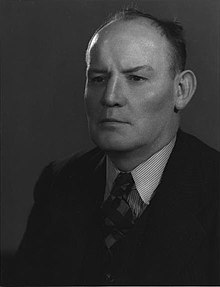Rowley James
| Rowley James | |
|---|---|
 |
|
| Member of the Australian Parliament for Hunter |
|
|
In office 17 November 1928 – 14 October 1958 |
|
| Preceded by | Matthew Charlton |
| Succeeded by | H. V. Evatt |
| Personal details | |
| Born |
14 June 1885 Lambton, New South Wales |
| Died | 4 July 1962 (aged 77) Ashfield, New South Wales |
| Nationality | Australian |
| Political party |
Labor (1928–31) Lang Labor (1931–36) Labor (1936–58) |
| Spouse(s) | Gladys Mary Davies |
| Children | Bert James |
| Occupation | Miner |
Rowland "Rowley" James (14 June 1885 – 4 July 1962) was an Australian politician and coalminer. Born at Lambton, New South Wales, the son of a Welshman (Moses James), he was educated at a government school and worked in the mines for twenty-five years (including a five-year stint in Western Australia). On 24 July 1912, he married Gladys Mary Davies. Having served the Collie River District Miners' Union of Workers, he returned to New South Wales to become part of the Australasian Coal and Shale Employees' Federation.
James was elected to the Australian House of Representatives for the Australian Labor Party in 1928, succeeding former Labor leader Matthew Charlton in the seat of Hunter. He was a critic of both the conservative government of Stanley Bruce and the Labor government of James Scullin for not prosecuting mine-owners during the protracted miner lock-out in northern New South Wales (1929–30), which led to accusations of inciting mob violence; Smith's Weekly published his record of convictions, including drunkenness and assaulting police.
A supporter of Jack Lang's proposal that New South Wales should not repay interest to British bond-holders in the height of the Great Depression, James joined Jack Beasley's Lang Labor Party, along with six other New South Wales MPs, who voted in opposition to defeat the Scullin government. At the ensuing elections, both Labor parties lost heavily but James easily retained his seat.
...
Wikipedia
